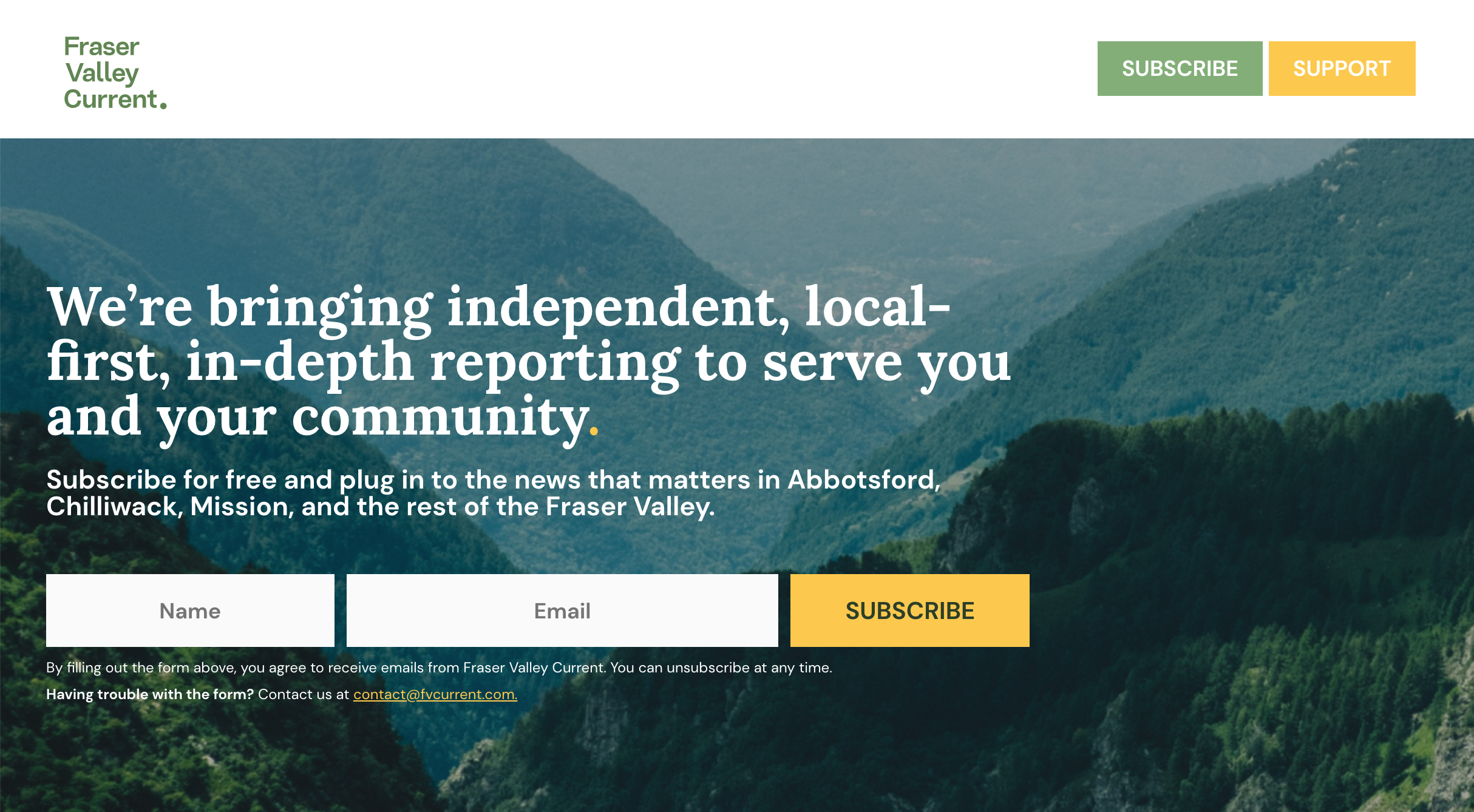Starting a new enterprise is always a gamble. It’s a bet on yourself, on those who will help you, and on those you hope to reach and serve.
The latter two are definitely the most important.
By the end of 2020, I had been a journalist for nearly 15 years, spending most of that time working for small newspapers in Vernon, Chilliwack, and Abbotsford. As the calendar ticked over to 2021, I became part of what I later heard has come to be called “The Great Resignation.” The Fraser Valley Current launched three months later, on March 22, 2021.
Since I joined my first newsroom in 2006, I had seen huge shifts in journalism in small- and mid-size communities. When I started in Vernon, my hometown, I was part of an 11-person newsroom that produced three large papers each week. By the end of 2020, that newsroom was less than half the size and it produced only a single newspaper a week. In Chilliwack, the second stop in my journalism career, the newspaper I had worked at was closed down. In Abbotsford, the third stop, there were four journalists in a city of 150,000 people.
The basics of journalism—collecting facts and presenting them to readers—haven’t changed. Journalists haven’t suddenly become corrupt or biased. But journalism is facing a resource crisis. There are more stories than ever, but fewer people to tell them.
Meanwhile, media organizations increasingly prioritized social media to connect with their audience. At most (not all) publications, the result has been that fewer reporters are being asked to write more stories, the quality of those stories has declined. The stories are useful. They provide information. But the stories aren’t as good as they could be and, because the job isn’t as much fun as it once was, many journalists are burned out.
I thought there was a better way. At least, I hoped there was. But I couldn’t do it on my own.
I had begun kicking around ideas in 2020, but determined that trying to do things on my own was doomed to failure. I have a family to feed, and making money through journalism requires an audience. Attracting a readership doesn’t happen overnight. What does happen overnight? Those kids (and the writer himself) get hungry.
But I was lucky. (Throughout my career I have been extraordinarily lucky both in the opportunities that have materialized, and the people who have been gracious enough to decide to work with me.) In Victoria and elsewhere in North America, a new journalism model was showing new promise. That model relied not on social media, radio waves, or hand-delivering newspapers, but on email.
In Victoria, what had started as a small newsletter had found an audience of more than 40,000 people, all who had signed up to receive a newsletter each day. It was a simple idea with the potential to change how people got their news and, crucially, how journalism was created in local communities.
The success of Capital Daily in Victoria led to the creation of a company to emulate that model across Canada. I was one of the first hires at what would come to become called Overstory Media Group. (You can read more about the company-side of things here.)
Having an actual company behind me allowed me to take a leap into the unknown. It allowed me to leave the accounting, registering of websites, and setting up web programs to the experts. It meant I had, even at the start, someone to proofread my work and spot out errors. And after a month, it allowed me to bring a second reporter on board.
Of course, since she joined me last April, Grace Kennedy has never just been a reporter. For years, I had followed Grace’s work at the Agassiz-Harrison Observer. Her stories showed curiosity, cleverness, and smarts. In Agassiz, she was a one-person newsroom, responsible for everything that happened in that paper.
But even when she started in April, I didn’t really know how important she would become. Her fingertips have been on every story we have published since April, and have been critical both for catching little things like typos and spelling errors, and to shape the tone and content of stories to ensure that each thing we publish meets our bar for quality. (It was Grace who hacked this piece down to a semi-manageable length.)
In November (a day after the atmospheric river began to devastate the Fraser Valley), Joti Grewal joined us. Joti came to us from the Langley Advance Times and started in the midst of the region’s largest disaster in decades. Joti’s poise and talent helped us keep our head above the metaphorical waters during that tumultuous time. And ever since, like Grace before her, Joti has added her own voice and perspective that has made The Current what it is today.
That, in a nutshell, is how we got here. But if you will indulge me, I also wanted to write a bit about the stories we choose to write and our general philosophy of journalism.

